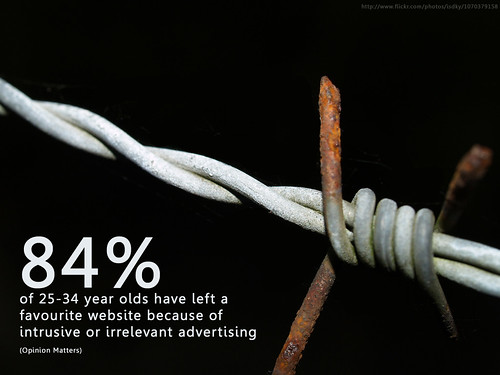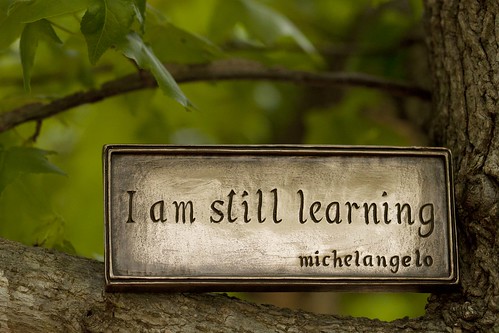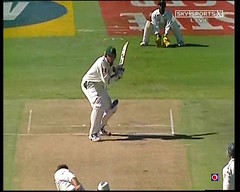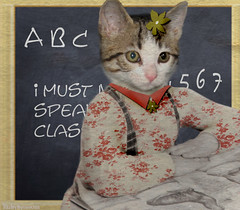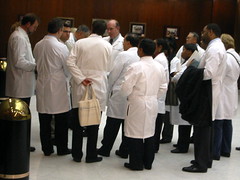tisdag 15 juli 2014
Datasopor
Jag träffade på artikeln om "datasopor" för en tid sedan och jag var tvungen att läsa den några gånger, dels för att det var mycket att läsa men framförallt för att jag tyckte det var ett så intressant ämne och dessutom skrivet med intressanta språkliga bilder.
Just detta att man på många håll i världen är liksom besatta av att samla så mycket information som möjligt (USA är väl mest på hugget här?) och att detta liksom blir en "sophög" som man inte riktigt vet hur man skall använda eller råkar använda på fel sätt som i exemplet med banklånekunden i artikeln, är något som kan vara värt att fundera över.
Vanligt omdöme verkar inte vara det som är högst prioriterat jämfört med sofistikerade algoritmer.
Etiketter:
algoritm,
annonsering,
datasopor,
förnuft.,
informationsöverflöd,
skräp
Teknologi i skolan
Det där med teknologi i skolan har många aspekter. Nu har jag inte varit i den direkta skolverksamheten på ett antal år men jag har lång erfarenhet. Denna erfarenhet kommer emellertid från en tid då det inte fanns de tekniska apparater som finns nu. Det började komma in en del datorer när jag arbetade i skolan men det var ju alls inte fråga om några smarta mobiler eller surfplattor.
När det gäller mindre barn i förskolan, är jag nog lite konservativ kan jag tänka. Min föreställning är att det nog är viktigt:
Kanske är detta bara villfarelser, men så skulle i alla fall jag vilja att det var.
När det gäller mindre barn i förskolan, är jag nog lite konservativ kan jag tänka. Min föreställning är att det nog är viktigt:
- att barn är utomhus så mycket som möjligt
- att de rör sig även inomhus
- att de kommunicerar med vuxna och varandra genom sagor, lekar och spel
- att de prövar på den teknik som finns i samhället (t.ex. surfplattor)
Kanske är detta bara villfarelser, men så skulle i alla fall jag vilja att det var.
tisdag 1 april 2014
Faran för förföriska förenklingar!
Vi har säkert alla vid något tillfälle hänvisat till att det bästa sättet att lära sig eller förstå något är att undervisa om det. Det låter rimligt och verkar fungera. I ett blogginlägg som jag hittade här på morgonen (via mina "spanare") får jag mig en riktig tankeställare för nog har jag själv vid något tillfälle åberopat det praktiska handlandets överhöghet i förhållande till det (passiva) lyssnandet.
Kanske har jag då omedvetet haft en föreställning om den där pyramiden som så tydligt visar att det man hör det glömmer man snart men det som man gör det kommer man minsann ihåg.
I det blogginlägg som jag har länkat till nedan tar man avstånd från sådana här förföriska förenklingar. Man ifrågasätter helt enkelt vilken forskning som har kunnat ge upphov till sådana tydliga skillnader mellan olika sätt att lära. Trots att det är oklart vad som har lett fram till resultaten är det som om en tydlig och fin grafisk framställning om lärande och retention som den där pyramiden/triangeln är alltid går segrande ur diskussionen och därför återkommer under decennierna i olika varianter.
Generelllt tycker jag att en sådan här artikel varnar oss för att alltför snabbt köpa enkla lösningar. Jag tror att många inom undervisningsområdet har anledning att tänka till här (gäller även mig). Läs inlägget. En varning är dock på sin plats: Titta inte bara på bilderna för då är risken stor att man faller för just det som varnas för; det var jag nämligen själv nära att göra!
http://acrlog.org/2014/01/13/tales-of-the-undead-learning-theories-the-learning-pyramid/

Detta verk är licensierat under en Creative Commons Erkännande-IckeKommersiell-DelaLika 4.0 Internationell Licens.
Etiketter:
abstract,
cone of retention,
förenkling,
learning,
lära,
practice,
praktisk,
retention,
teoretisk
onsdag 26 mars 2014
Stå på egna ben och kanske några till?
Det yttersta syftet med olika sorters lärande oavsett om det sker i formell utbildning eller genom mer informell informationsinhämtning är nog individens utveckling till en som själv är kapabel att lära när kursen eller utbildningen är avklarad.
Idag har vi utomordentliga möjligheter att informera oss om snart sagt varje intresseområde. Men det sker naturligtvis inte utan att man själv har drivkraften att ta för sig av allt som finns att tillgå.
Den mest basala strategi som nog de flesta människor idag har prövat på är att "googla" på det som man vill veta. Sen kanske man nöjer sig med detta. Sannolikt tänker man ganska lite på att den information som finns på nätet är resultatet av att många andra människor har valt att dela med sig av sitt kunnande. Allt är naturligtvis inte utdelat på nätet av rent altruistiska skäl för att hjälpa andra utan åtskilligt, kanske det mesta, har pressats ut på nätet för att man vill bli sedd. För företag är detta naturligtvis i någon mån nödvändigt men också många individer lyckas skapa sig en viss stjärnstatus genom attt synas på nätet. Oavsett vilket kan man givetvis välja det man är intresserad av.
Nu är det alls inte de här aspekterna utav eget lärande jag tänkte ta upp här utan jag vill mer fokusera på de möjligheter man har att faktiskt informera sig utöver det enkla googlandet när man vill veta något specifikt.
I ett mycket intressant blogginlägg med titeln Five steps in developing a Personal Learning Network (PLN) skriver författaren om hur man kan ta ansvar för sitt eget lärande efter det att man har gått färdigt kursen eller slutat sin formella utbildning.
Inlägget tar upp 5 olika steg för att hålla sig informerad av egen kraft:
- Dela med dig av det du producerar
- Samla idéer (crowdsource) från de som har något att bidra med t.ex. via Twitter
- Träng djupare in i olika områden genom att följa bloggar inom ditt intresseområde
- Håll konversationen igång genom att följa och kommentera inom olika kanaler
- Organisera på något sätt så att du kan hålla reda på det du samlar
Som vanligt är det alltid bäst att läsa originaltexten som jag skrivit om här.
Etiketter:
lärande,
nätverk,
personligt nätver,
pln,
sociala medier
söndag 2 mars 2014
Professional vision
The other day I was arguing for the benefits, or rather the necessity, of conceptual knowledge (theoretical knowledge) in two student groups. I presented my view, at length, in both groups and my overall conclusion was that with conceptual knowledge within a certain domain your perception will be more differentiated and detailed compared with a layperson's perception. See also av Swedish posting here.
When I reflected on my presentations afterwards, it suddenly struck me that I forgot to present what , according to my view, might have been my most convincing examples. A recurring example in my lectures on this topic has been Charles Goodwin's article Professional Vision (URL: http://www.sscnet.ucla.edu/clic/cgoodwin/94prof_vis.pdf). In his article Goodwin shows what a "professional vision" entails by taking, first, an example from archeology and, second, an example from a court trial.
In the archeology example Goodwin shows that the expert archeologist, through using the discursive tools of the profession, can perceive what the novices cannot yet perceive until the expert archeologist actually teaches the novices what to see while standing in the mud. The other example is quite a nasty example where an expert police officer actually convinces the court that a severely beaten black man has presented a threat to a group of white police officers. By showing a video from CCTV, frame by frame, the expert convinces the court that the black man was about to attack the white police officers and that they had defended themselves. Both cases are meant to illustrate the concept of professional vision even if we probably dislike the use of professional vision in the second example.
Whereas professional vision can be viewed as an argument for the benefits - and necessity - of a formalized discourse in any practice, my other example could in some way be viewed as an argument for the informal and situated character of learning. John Seely Brown and Paul Duguid's Stolen Knowledge (URL: http://www.johnseelybrown.com/StolenKnowledge.pdf) shows that not all learning can be formalized into propositional knowledge and the striking example here is how a person learning to play an instrument succeeds in passing the difficulties by "stealing knowledge" while watching real musicians. The article is also a very handy overview of situated learning and legitimate peripheral participation.
Enjoy reading these articles which supplement (!) my presentation.
Etiketter:
conceptual,
discourse,
formal,
informal,
lpp,
professional,
situated,
theory,
vision
måndag 24 februari 2014
Why theories?
Some of you might have thought: Why learning theory? or Why theories generally?
In the next few minutes I will give my view on this issue. Let's have some examples. When I watch a game of cricket on tv, I understand absolutely nothing and there are just some people in white running to and fro. There are some recognizable things involved such as a ball, a bat and some protective equipment. I quickly turn it off. Likewise I find golf tedious and boring. It is about getting a little white ball into a hole using as few strikes as possible. I could go on with curling, American football and so on. Actually, all are sports I don't understand.
I guess this is how my dear mother understood football (i.e. soccer). I presume she saw a bunch of men (only men when she was alive) running to and fro on a grass field. Presumably, she new that the ball should be kicked into the goal just as I know that the golf ball should end up in that little hole in the grass.
What I am trying to say here is that anyone who is ignorant of a game or ignorant generally perceives in an ignorant/restricted way. The keyword here is perception.
As soon as we have some knowledge of a sports game or anything else we perceive in different way. As soon as we know that the players in the football team have different tasks to solve, as soon as we know the rules of games generally we become quite different perceivers. And if we turn our attention to the players in the field, they know the rules and they will definitely perceive the game differently after they have heard the coach's strategic plans for the match. But let us leave the sports games and turn our attention to traditional cognitive domains (of course sports are cognitive domains, too).
I have tried to show that conceptual knowledge is not something you just know or "have". Instead, conceptual knowledge changes your perception. I have sometimes used the metaphor of a torch with which you light up certain areas while letting others remain in darkness. It is not a bad metaphor cause when you have a certain theoretical perspective you perceive the world in a certain way whereas individuals with other theoretical perspectives perceive in a different way. I guess national economy - not to mention politics - could be illustrating examples here.
When we turn our attention to learning we all know that there are theories trying to explain how learning occurs and the mechanisms involved. Being a novice in a field I think it is quite common to view theory as a prescription for how to do. Learning theories are not to-do-lists! Let us see if I can explain this.
Take language and writing as an example. I think we all have been taught or in some other way have been told that grammar knowledge is necessary to write properly and maybe even to speak.
However, communication is fundamentally human and such communication certainly does not need a formalized grammar to work. But how about writing? Well, text is a very sophisticated technology to turn sounds into signs on some medium for example paper or more common today, computer documents. Does all that mean that without grammar you can neither talk nor write properly or comprehensible? Of course not!
I cannot know for certain but I don't think that the majority of authors put grammar first when producing interesting books. In the worst of cases you produce faultless nonsense with your grammar knowledge. Let me give an example. When I was in secondary schools, I was very good at grammar, particularly when we studied German. I knew all the paradigms, rules and word endings, I could analyze sentences and even write without errors. Still I was very bad at speaking because the grammar was like a judge on my shoulder judging every word for their proper endings. Accordingly there was no communication!
Might this be equivalent to teaching, meaning that you need to know about learning theory to be able to teach? Of course not! To teach someone something is also a fundamental undertaking that people have done since time begun. Anyone knowledgeable might tell and show the yet ignorant, just as even my mother might have kicked a football, hopefully into the right goal. So why do we need learning theories, then, if anyone can teach the ignorant?
On the one hand, teaching is a matter of training and practice. The one who teaches every day acquires some competence even without learning theories. The one who observes the doctor for some time might also appear as a doctor dressed like a doctor and saying the right words, maybe the nice comforting words to the anxious patient. Afterwards the patient might even tell others about the nice new doctor. Of course, this is a fictitious example but still it has occurred among doctors and even pilots in large airliners. Consequently, we can also appear as teachers and even be appreciated as good teachers. Sometimes we say that s/he is working as a teacher (cf. to be a teacher). But where does this strange reasoning lead us? Is it just a matter of being a good imitator? I think not!
When you have conceptual knowledge, like the real doctor, the real pilot, the real teacher, you are a different because you perceive differently. Therefore learning theories (biomedicine, aviation) are not prescriptions on how to to in the first place (as I was taught to view the German grammar) even if they could give the practitioner some guidance.
Student teachers often say, when they practice during their training, that they want to apply the theories they have studied. I don't think it works that they. On the contrary, I think that theories viewed that way could even harm or damage the enthusiasm of teaching like the grammar did for my ability to speak German. Actually, I think that grammar generally has made lots of people afraid of writing, fearing that they will make mistakes they don't understand they do.
As I said earlier, there can be many excellent teachers without theoretical knowledge of learning theories. What is important, though, is that like the fake doctor and the fake pilot, the fake instructor is restricted to what s/he has picked up from others and then tried. If it worked out well it might be taken as an indication of how it is and not how it happened to be a successful move.
Having access to the practitioners conceptual tools, we can vary our activities according to the needs. This might also be a skill we acquire as a result of experience but conceptual knowledge will also constitute the foundation for decisions not directly linked to a particular situation. The individual with conceptual knowledge, actually has a much better ability to perceive more general aspects of a situation.
If a sentence doesn't work or sounds strange it is a great ability to be able to analyze grammatically but usually not while talking. Likewise you reflect on your teaching sessions sometimes before, sometimes afterwards and eventually even simultaneously when you have the tools for reflection. And this is of course a cyclic process meaning that experience and theoretical reflection nurture each other so that your teaching develops continuously. Without your conceptual tools you are tied to each specific event.
You might be a better teacher just teaching but I would say that the conceptual knowledge is a very efficient shortcut in that process. And above all, it gives you the ability to leave the actual situation and enter a conceptual level when you discuss teaching with your colleagues. And this is absolutely crucial for the development of teaching and learning. It frees the knowledge development from the individual, meaning that a certain achievement or development of the teaching practice at your department does not disappear when a certain person is not longer available. That is the way conceptual knowledge has always worked. It figuratively leaves the individual and the particular instances and joins the body of conceptual knowledge in a particular domain.
Still practice is here and now and you will neither be able to speak German nor to teach others only relying on theoretical knowledge. Someone said: Practice without theory is like a bird never being able to lift off from the ground; on the other hand, theory without practice is like flying never being able land.
/Lars-Erik Jonsson

Detta verk är licensierat under en Creative Commons Erkännande-IckeKommersiell-DelaLika 4.0 Internationell Licens.
In the next few minutes I will give my view on this issue. Let's have some examples. When I watch a game of cricket on tv, I understand absolutely nothing and there are just some people in white running to and fro. There are some recognizable things involved such as a ball, a bat and some protective equipment. I quickly turn it off. Likewise I find golf tedious and boring. It is about getting a little white ball into a hole using as few strikes as possible. I could go on with curling, American football and so on. Actually, all are sports I don't understand.
I guess this is how my dear mother understood football (i.e. soccer). I presume she saw a bunch of men (only men when she was alive) running to and fro on a grass field. Presumably, she new that the ball should be kicked into the goal just as I know that the golf ball should end up in that little hole in the grass.
What I am trying to say here is that anyone who is ignorant of a game or ignorant generally perceives in an ignorant/restricted way. The keyword here is perception.
As soon as we have some knowledge of a sports game or anything else we perceive in different way. As soon as we know that the players in the football team have different tasks to solve, as soon as we know the rules of games generally we become quite different perceivers. And if we turn our attention to the players in the field, they know the rules and they will definitely perceive the game differently after they have heard the coach's strategic plans for the match. But let us leave the sports games and turn our attention to traditional cognitive domains (of course sports are cognitive domains, too).
I have tried to show that conceptual knowledge is not something you just know or "have". Instead, conceptual knowledge changes your perception. I have sometimes used the metaphor of a torch with which you light up certain areas while letting others remain in darkness. It is not a bad metaphor cause when you have a certain theoretical perspective you perceive the world in a certain way whereas individuals with other theoretical perspectives perceive in a different way. I guess national economy - not to mention politics - could be illustrating examples here.
When we turn our attention to learning we all know that there are theories trying to explain how learning occurs and the mechanisms involved. Being a novice in a field I think it is quite common to view theory as a prescription for how to do. Learning theories are not to-do-lists! Let us see if I can explain this.
Take language and writing as an example. I think we all have been taught or in some other way have been told that grammar knowledge is necessary to write properly and maybe even to speak.
However, communication is fundamentally human and such communication certainly does not need a formalized grammar to work. But how about writing? Well, text is a very sophisticated technology to turn sounds into signs on some medium for example paper or more common today, computer documents. Does all that mean that without grammar you can neither talk nor write properly or comprehensible? Of course not!
I cannot know for certain but I don't think that the majority of authors put grammar first when producing interesting books. In the worst of cases you produce faultless nonsense with your grammar knowledge. Let me give an example. When I was in secondary schools, I was very good at grammar, particularly when we studied German. I knew all the paradigms, rules and word endings, I could analyze sentences and even write without errors. Still I was very bad at speaking because the grammar was like a judge on my shoulder judging every word for their proper endings. Accordingly there was no communication!
Might this be equivalent to teaching, meaning that you need to know about learning theory to be able to teach? Of course not! To teach someone something is also a fundamental undertaking that people have done since time begun. Anyone knowledgeable might tell and show the yet ignorant, just as even my mother might have kicked a football, hopefully into the right goal. So why do we need learning theories, then, if anyone can teach the ignorant?
On the one hand, teaching is a matter of training and practice. The one who teaches every day acquires some competence even without learning theories. The one who observes the doctor for some time might also appear as a doctor dressed like a doctor and saying the right words, maybe the nice comforting words to the anxious patient. Afterwards the patient might even tell others about the nice new doctor. Of course, this is a fictitious example but still it has occurred among doctors and even pilots in large airliners. Consequently, we can also appear as teachers and even be appreciated as good teachers. Sometimes we say that s/he is working as a teacher (cf. to be a teacher). But where does this strange reasoning lead us? Is it just a matter of being a good imitator? I think not!
When you have conceptual knowledge, like the real doctor, the real pilot, the real teacher, you are a different because you perceive differently. Therefore learning theories (biomedicine, aviation) are not prescriptions on how to to in the first place (as I was taught to view the German grammar) even if they could give the practitioner some guidance.
Student teachers often say, when they practice during their training, that they want to apply the theories they have studied. I don't think it works that they. On the contrary, I think that theories viewed that way could even harm or damage the enthusiasm of teaching like the grammar did for my ability to speak German. Actually, I think that grammar generally has made lots of people afraid of writing, fearing that they will make mistakes they don't understand they do.
As I said earlier, there can be many excellent teachers without theoretical knowledge of learning theories. What is important, though, is that like the fake doctor and the fake pilot, the fake instructor is restricted to what s/he has picked up from others and then tried. If it worked out well it might be taken as an indication of how it is and not how it happened to be a successful move.
Having access to the practitioners conceptual tools, we can vary our activities according to the needs. This might also be a skill we acquire as a result of experience but conceptual knowledge will also constitute the foundation for decisions not directly linked to a particular situation. The individual with conceptual knowledge, actually has a much better ability to perceive more general aspects of a situation.
If a sentence doesn't work or sounds strange it is a great ability to be able to analyze grammatically but usually not while talking. Likewise you reflect on your teaching sessions sometimes before, sometimes afterwards and eventually even simultaneously when you have the tools for reflection. And this is of course a cyclic process meaning that experience and theoretical reflection nurture each other so that your teaching develops continuously. Without your conceptual tools you are tied to each specific event.
You might be a better teacher just teaching but I would say that the conceptual knowledge is a very efficient shortcut in that process. And above all, it gives you the ability to leave the actual situation and enter a conceptual level when you discuss teaching with your colleagues. And this is absolutely crucial for the development of teaching and learning. It frees the knowledge development from the individual, meaning that a certain achievement or development of the teaching practice at your department does not disappear when a certain person is not longer available. That is the way conceptual knowledge has always worked. It figuratively leaves the individual and the particular instances and joins the body of conceptual knowledge in a particular domain.
Still practice is here and now and you will neither be able to speak German nor to teach others only relying on theoretical knowledge. Someone said: Practice without theory is like a bird never being able to lift off from the ground; on the other hand, theory without practice is like flying never being able land.
/Lars-Erik Jonsson

Detta verk är licensierat under en Creative Commons Erkännande-IckeKommersiell-DelaLika 4.0 Internationell Licens.
Etiketter:
conceptual knowledge,
learning,
perceive,
perception,
teach,
teacher,
theory
Prenumerera på:
Kommentarer (Atom)



